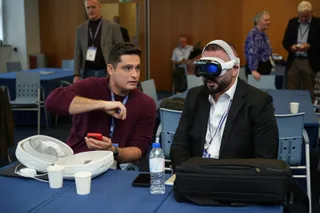Enhancing Adaptive Training for US Air Force ATCs
Contact Our Team
For more information about how Halldale can add value to your marketing and promotional campaigns or to discuss event exhibitor and sponsorship opportunities, contact our team to find out more
The Americas -
holly.foster@halldale.com
Rest of World -
jeremy@halldale.com

Aptima has recently completed a $750,000 AFWERX Phase II Small Business Technology Transfer (STTR) award to develop a brain-computer interface that incorporates neurophysiological signals into an adaptive learning framework to enhance motor and cognitive skills for Air Traffic Controllers (ATCs).
U.S. Air Force ATC operators receive only 72 days of technical training. Therefore, even incremental improvements to effectiveness and efficiency of ATC training programs can have a significant impact; advanced solutions are needed to enhance and accelerate ATC training to maximize mission readiness and to reduce personnel and material costs. Adaptive learning methods are evolving rapidly to meet these needs by tailoring training to the abilities of the learner. Adaptive models infer an individual’s current skill level and intelligently select training materials to help them progress to more advanced stages. The models are informed by behavioral data, that is, by performance on a training task. They do not, however, take into account the learner’s neurophysiological state. Especially in such a mentally demanding domain as ATC, neurophysiological biomarkers corresponding with cognitive and affective states are needed to provide crucial context, enabling deeper insights that generate recommendations for more optimal training policies.
To address these challenges, Aptima, Inc. and the University of Chicago developed NeuroAdapt, a brain-computer interface that incorporates neurophysiological signals into an adaptive learning framework, enhancing motor and cognitive skills for elite skill training. NeuroAdapt fuses training performance data with rich neurophysiological data to derive deep insights into the learner’s cognitive state. Aptima’s machine learning-backed adaptive learning algorithms then use this information to control training parameters in real time, tailoring the paradigm to the unique needs of the individual learner. The company has devised a theory-based, data-driven approach to measure EEG, EKG, and other neurophysiological signals while the trainee is actively using the system.


